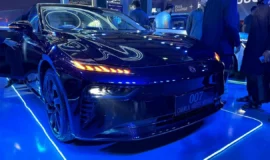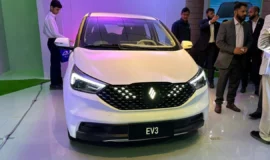
Choosing between a petrol and an electric bike can be a tough decision especially if you are mostly commuting in cities. Are you also troubled by the decision of not knowing which bike to buy? Worry no more for we bring you a detailed comparison of a petrol bike vs. electric bike. Both electric and petrol bikes have their pros and cons. Petrol bikes win in some aspects like range, speed and performance, etc. whereas the electric bikes dominate some other factors like low maintenance & traveling cost etc.
So, let’s see which is more suitable as per your unique requirements.
Petrol Bike vs. Electric Bikes: Which is The Winner?
Everyone is familiar with petrol bikes as they are used by every other person all over Pakistan. However, the launch of the first electric bike, Jolta Electric, back in 2021 piqued an interest in the new advent as well. And the popularity of electric bikes and scooters have grown significantly as many other brands have introduced their two-wheeler EVs in Pakistan.

The battle between a petrol and electric bike can take complex turns. Like, before considering buying an EV, you must ensure a stable electricity supply to your location. So, learning about the core differences between and the suitability of electric & petrol bikes will help you make an informed decision when you set out to buy a bike.
Let’s start with the first difference:
Engine Efficiency and Running Cost
Beginning with the running cost of the bikes, electric bikes certainly take the lead over the fuel-powered engine. A petrol bike uses an internal combustion engine (ICE) which provides low efficiency, whereas an electric battery gives us high efficiency. Here, by efficiency we mean that the cost per kilometer will be lesser in an EV than a petrol bike.

For instance, an electric bike consumes 2 units of electricity for a full charge on average. And average range of electric bike is nearly 60 km on a single charge. Also, if we assume the average electricity cost per unit is Rs. 45, the projected per kilometer cost of electric bike will be Rs. 1.5. In comparison, a 70cc gasoline engine achieves 55 km per liter, costing you around Rs. 5 per km (Petrol price Rs. 275.6/l). Hence, the overall cost of running a petrol bike is higher per kilometer than running an electric bike, making EV the winner in this regard.
Disclaimer: The calculated electricity cost of EV may vary according to the range, location, number of units or the overall electricity consumption of your house.
The Range
Without a doubt, there exists a stark difference between the ranges of electric bikes and petrol bikes. You can easily travel long distances on a gasoline engine, be it outside the city or in the north as petrol stations can commonly be found anywhere in Pakistan.
Contrastingly, an EV is only efficient for traveling within the city. On average, an electric motor only allows you to travel 50-70 km within the city. Since, there are no charging points available commonly in Pakistan, an EV binds you to stick to short commutes only.
Read more on: Range of Electric Bikes: How Far Can They Go?
Speed and Performance
It goes without saying that a fuel-powered engine offers better performance as compared to an electric bike. Due to the limited variety offered in electric bikes, we can hardly compare a petrol bike’s speed and performance with an EV bike.

Petrol engines are designed to provide a thrilling pick and better performance. Whereas, an electric motor system fails to offer the same speed and power. The acceleration of many e-bikes is better than a 70cc bike’s acceleration in Pakistan. To make it concise and clear, an EV can achieve a top speed of 45-60 km/h (on average) while a petrol engine can achieve an average top speed of 100 km/h. Hence, petrol bikes come out victorious in the battle of petrol bike vs. electric bike in this aspect.
Initial Cost
Although the price of electric and petrol bikes vary according to the brand and the model, the initial cost of an EV is higher than a petrol bike on average. Also, there are limited options available when we dive into the search for an electric bike. Hence, petrol bikes can offer you a better price range than an EV of the same league. However, almost all EVs come with a battery, lights, design and motor updates whereas their petrol counterparts do not offer the same advantages.
You may also like:
United Electric Bikes’ Prices in Pakistan
Metro Electric Bikes & Scooters – Price, Specs & Features
Road Prince Electric Bike E-Go Price in Pakistan, Specs & Features
Maintenance Cost
Significantly, a petrol engine requires maintenance more often than an electric motor bike. As mentioned before, an electric bike offers more features than a petrol bike of the same league but asks for little maintenance. If you already own a petrol bike, you may be aware of how they require maintenance once every month or two. However, electric bikes save you from this monthly fatigue.

Resale Value
Your common petrol bikes have been around for a long time and therefore are more commonly known to the people, making their resale value higher. However, e-bikes are not so popular among people and the depreciation of their battery also reduces their resale value significantly. Hence, their resale value is lesser as compared to the usual petrol bikes. So, if you are buying an EV for the purpose of resale, it is definitely a bad idea.
Final Takeaway
In conclusion, the debate of petrol bike vs. electric bike has no clear winner overall. EVs enjoy dominance in various aspects like running cost and maintenance cost, while petrol bikes are unbeaten in other factors like speed and range. If you require traveling short-distances within the city, electric bikes are a great environment-friendly and cost-effective choice. Whereas, for going on longer commutes and decent performance, and better resale value, petrol bikes are the answer.
You may also like:








Leave a Reply